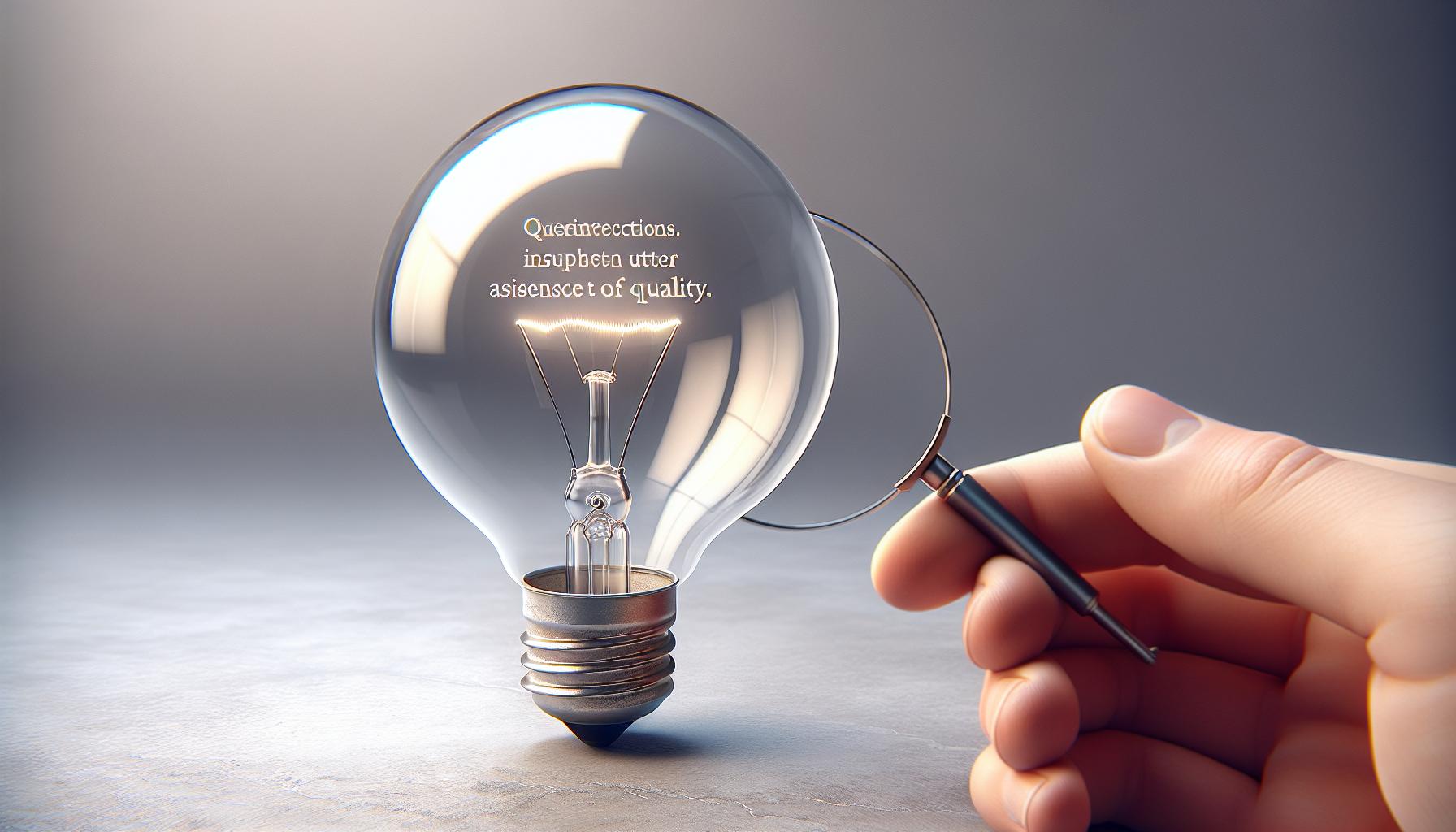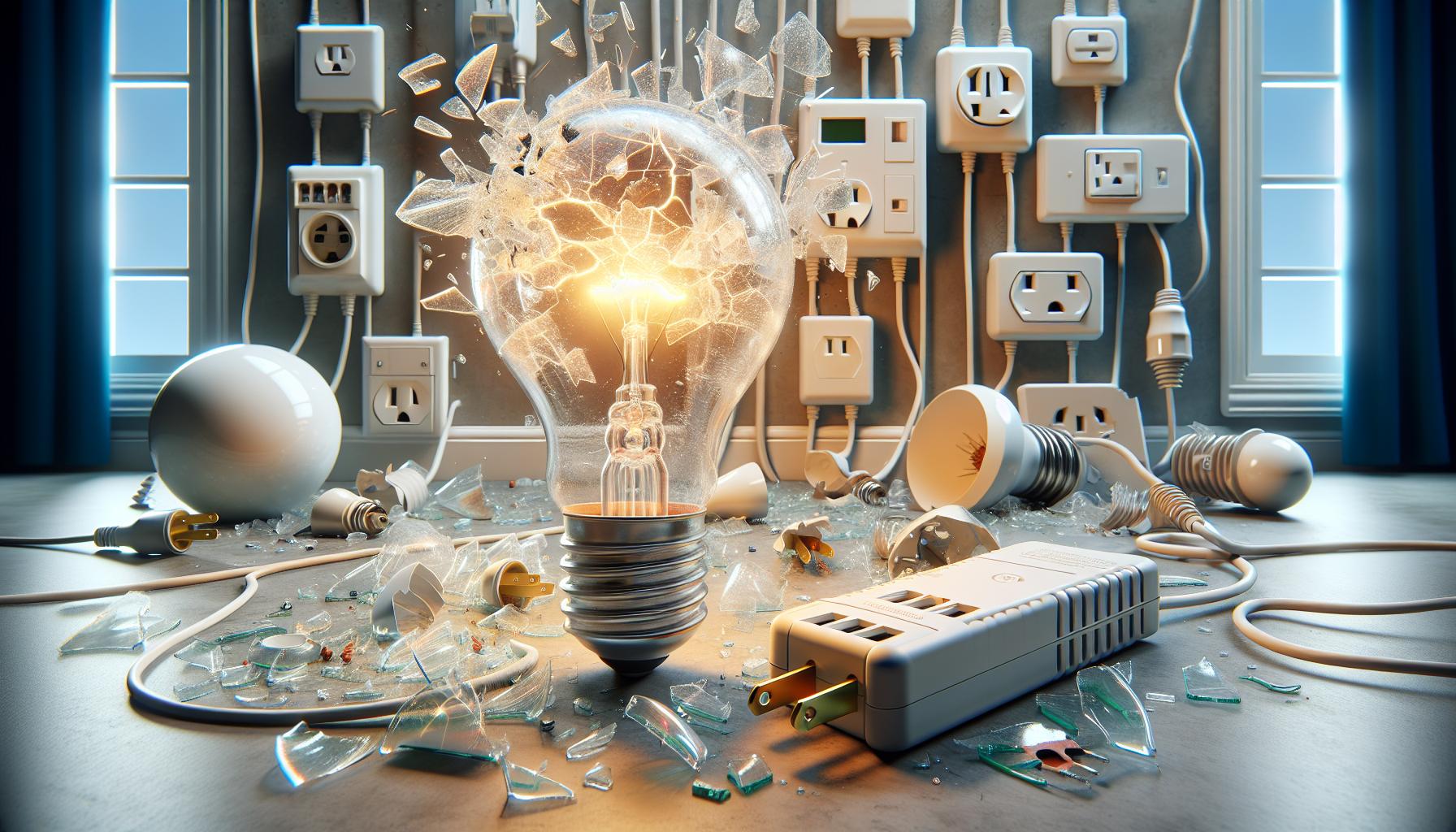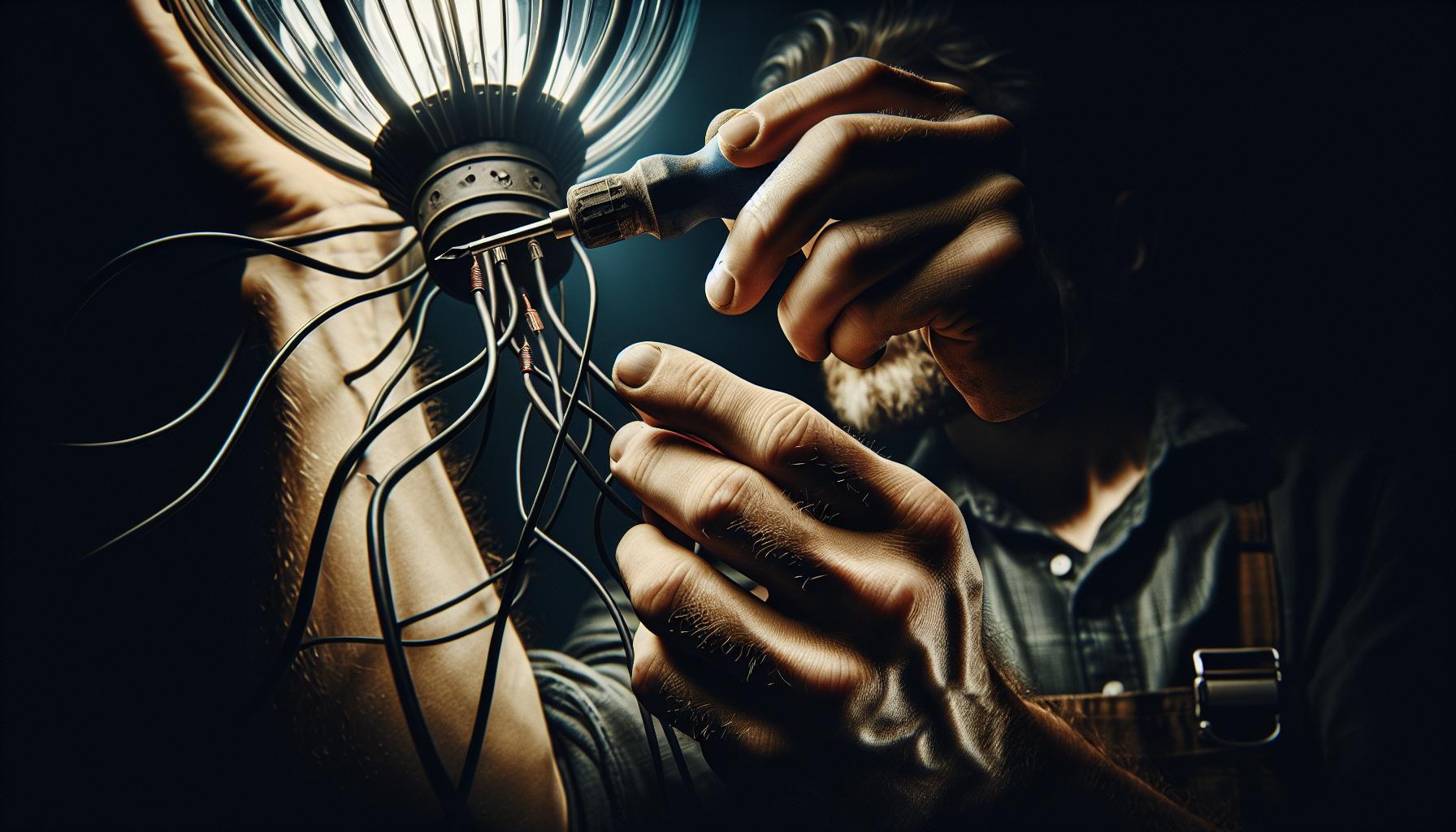Ever walked into a room and been startled by the sharp pop of a light bulb bursting? You’re not alone. It’s a surprisingly common occurrence that can leave you wondering what just happened.
Light bulbs are a staple in every home, but they can sometimes end in a dramatic exit. Let’s dive into the reasons behind these unexpected light shows and uncover the mysteries of exploding light bulbs.
What Causes a Light Bulb to Explode?
As a light bulb aficionado with a keen eye on DIY projects and a soft spot for perfectly lit rooms, you’ve likely encountered the startling pop of a light bulb exploding. It’s not just a nuisance interrupting your cozy ambiance; it’s a hazard that could have been prevented. Let’s shed some light on the usual suspects causing these surprising bursts.
First up, poor build quality can’t be underestimated. Low-cost bulbs often skimp on materials and manufacturing processes. This can lead to flaws in the glass or the bulb’s structure that set the stage for failure when the bulb heats up.
- Improper bulb wattage for your fixture also tops the list. If you’ve ever put a high-wattage bulb in a low-wattage fixture, you’ve invited trouble. The excess heat can’t dissipate properly, leading to a buildup of pressure and, eventually, a shattered bulb.
- Moisture is another culprit to watch out for. Ever noticed a bulb popping right after being turned on in a damp environment? That’s moisture creating a fracture in the hot glass. Be especially cautious with outdoor lights or bulbs near bathrooms.
Let’s talk about the base of the bulb. A loose connection here can generate arcs of electricity. Not only does this zap raise the heat, but it may also ignite any flammable dust or debris that’s nestled in the fixture. Make sure your bulbs are snug and secure.
Here’s a breakdown of some common exploding bulb triggers:
| Trigger | Cause | Preventative Action |
|---|---|---|
| Poor Build Quality | Material flaws, weak glass | Invest in reputable brands |
| High Wattage | Excess heat | Match bulbs to fixture rating |
| Moisture | Glass fracture due to heat | Use weatherproof bulbs outdoors |
| Loose Connection | Electrical arcs | Ensure bulbs are screwed tight |
Taking these factors into account, you’ll be better prepared to keep your lights shining without any unexpected finales. Remember, the right bulb chosen with care and set up correctly becomes more than just a light source – it’s a safe, dependable part of your home’s charm. Keep an eye on these details, and you’ll reduce the risk of a light bulb’s dramatic exit.
Overheating
When tackling light-related DIY projects, you’ve probably noticed light bulbs can get quite hot. Understanding overheating—why it happens and how it affects your bulbs—is crucial to maintaining a safely lit home environment. Excessive heat can compromise the integrity of a light bulb, leading to premature failure or, in some cases, explosions.
Typically, light bulbs generate heat as a byproduct of producing light. This is especially true for incandescent bulbs, which work by heating a filament until it glows. However, when a light bulb continues to operate in an overheated state, the high temperature can cause the material of the bulb to expand and eventually shatter.
To mitigate the risks of overheating, you should:
- Ensure proper ventilation around light fixtures
- Avoid using bulbs with a higher wattage than your fixture’s rating
- Consider switching to LED bulbs as they produce less heat
Certain enclosed fixtures or recessed lighting designs may trap heat, significantly increasing the temperature around the bulb. This not only raises the risk of an exploding bulb but can also be a fire hazard if left unchecked. Using the right type of bulb for an enclosed fixture is therefore not just a matter of bulb longevity but also of safety.
Dimmer switches also play a role in overheating. When connected to bulbs not designed for dimming, these switches can cause fluctuating electrical resistance, resulting in excess heat build-up. If you’re fond of dimmer switches for the ambiance they provide, make sure the bulbs you pair with them are explicitly labeled as dimmable.
Remember, light bulbs are like any other home equipment; they need the right conditions to operate safely and efficiently. By keeping the potential for overheating in check, you’ll ensure that your cherished home lighting projects continue to shine brightly without the risk of interrupting your peaceful living space with the pop and fizzle of an exploding light bulb.
Faulty Manufacturing
« Light Bulb Performance by Type: Find Your Ideal Illumination
What Are 100 Watt Light Bulbs: Understanding Brightness and Efficiency »
Occasionally, the culprit behind a light bulb explosion is simply a manufacturing defect. These defects can range from minute cracks in the glass to improperly installed filaments. Quality Assurance in the manufacturing process is crucial but sometimes errors slip through, especially with less meticulous manufacturers.
When a bulb is produced, the glass must be free of impurities and structural weaknesses. Even the smallest imperfection can lead to dramatic failures. It’s like a chain reaction; a tiny crack can quickly grow under the stress of heat and electrical fluctuations, leading to a shattering of the bulb.
Filament defects are another concern. If the filament isn’t secured correctly or made from subpar material, it won’t just burn out prematurely—it might overheat. That overheating can cause the nearby glass to expand rapidly and, you guessed it, explode. This is particularly an issue in cheaper bulbs where cost-cutting measures mean a compromise in material quality and assembly protocols.
Consider the base of the bulb as well. Inexpensive manufacturing often leads to bases that are weakly bonded to the glass. When you screw these bulbs in, the pressure can cause a fracture at the base, which may not be immediately noticeable but can be the beginning of the end for your light bulb.
Moreover, the gas inside the bulb needs to be carefully controlled during production. Most modern bulbs are filled with inert gases, like argon, at specific pressures to help protect the filament and improve efficiency. However, if the pressure isn’t quite right, it’s a recipe for instability. Inconsistent gas application can cause pressure imbalances, stressing the glass from the inside out.
To steer clear of manufacturing defects, here’s what you can do:
- Stick to Reputable Brands known for their strict quality control.
- Pay attention to Certifications: look for marks from recognized testing organizations.
- Upon purchase, perform a quick visual inspection for any obvious Signs of Damage or imperfection.
Remember, investing a little extra in quality can save you from the startling experience of a light bulb explosion. It’s worth considering higher-priced bulbs as a form of insurance against potential damage and to ensure peace of mind. After all, a robust bulb not only shines brighter but tends to live longer.
Power Surges
Ever plugged in too many gadgets and seen the lights flicker? That’s often a tell-tale sign of a power surge which can, in extreme cases, cause your light bulbs to explode. Power surges are sudden, brief spikes in electricity that can damage the wiring and components of your lighting.
When it comes to your light bulb, a power surge forces an overwhelming amount of electricity through its delicate filaments. Imagine trying to run a marathon in under 3 minutes—your bulbs are feeling that intense pressure, and sometimes, they simply can’t withstand it. So, they give out dramatically.
Often, we associate power surges with dramatic events like lightning strikes or large appliances kicking on. They can originate from both external and internal sources. Here’s the critical part: you might not know a power surge has occurred until you notice the aftermath—a room suddenly gone dark due to an exploded bulb.
Protecting your home from these unpredictable power surges is vital. While you can’t do much about lightning, you can safeguard your electrical systems by using surge protectors. These devices act like bouncers at a club, ensuring only the right amount of electricity gets through to your appliances and light fixtures.
Key Points to Remember for Preventing Damage from Power Surges:
- Employ surge protectors in your home to shield your electronics.
- Know that power strips are not the same as surge protectors. Don’t confuse the two!
- Consider installing a whole-house surge protection system to cover all bases.
Let’s face it, investing a bit in protection can save a lot in the long run. It keeps not just your light bulbs, but all your favorite gadgets safe and sound. Regular checks and updates to your home’s electrical system can also keep surges at bay. Give your bulbs and appliances the protection they deserve, and they’ll keep shining bright for you, minus the drama of unexpected explosions.
Loose Wiring
You might not think about it much, but the wiring in your house is like the nervous system of your home’s electrical network. As a light bulb enthusiast and a DIY aficionado, you know that loose wiring can be a significant culprit for light bulb explosions. When the electrical connections in your lamp or light fixture are not secure, it can lead to intermittent contact between the wires. This intermittent contact can cause sparking, which is enough to potentially shatter your light bulb.
This doesn’t mean you should inspect the wiring in your walls. Leave that to the professionals. But for light fixtures and lamps, it’s a different story. You should routinely check the tightness of bulb sockets and ensure that the screw caps are fitting well. It’s a simple task but one that goes a long way in preventing mishaps.
When you’re tackling your latest home project, make a mental note to check the lamp’s wiring if the bulbs seem to be burning out quickly or if you’ve had the misfortune of a burst. Pay attention to light flickering — it’s often a tell-tale sign of loose connections.
Here’s what you need to do:
- Turn off the power to the fixture before you start tinkering.
- Use a screwdriver to tighten any loose connections.
- If you’re not comfortable with DIY electrical work or if the issue persists, call an electrician.
Remember, it’s not just about saving your light bulbs; loose wiring can also be a fire hazard. So while you’re protecting your lighting investments, you’re also keeping your home safe. When it comes to electrical safety, there’s no room for compromise. Simple preventative measures can save you from the sudden pop and fizzle of an exploding bulb and keep your home’s ambiance just the way you love it.
Conclusion
You’ve got the scoop on why light bulbs can go out with a bang. Remember, keeping an eye on your bulb sockets and ensuring everything’s tight and right is key to preventing these startling incidents. If you’re ever in doubt or spot a loose connection, don’t hesitate to call in a pro. By staying vigilant, you’re not just safeguarding your light bulbs but also keeping your home safe from potential electrical fires. Stay bright and stay safe!
Frequently Asked Questions
Why do light bulbs explode?
Light bulbs can explode due to various reasons, such as faulty manufacturing, power surges, and loose wiring. Faulty bulbs may have weak spots that can cause them to shatter, while power surges can overload the bulb’s capacity. Loose wiring can create intermittent contact that may lead to sparking and bulb breakage.
What can cause a light bulb to shatter beyond repair?
A light bulb can shatter beyond repair due to severe power surges, significant manufacturing defects, or extreme cases of loose wiring, where sparking causes the glass to break.
How can I prevent my light bulbs from exploding?
To prevent light bulb explosions, make sure your electrical connections are tight, the bulb sockets are secure, and avoid overloading your circuits. Regularly check screw caps to ensure they fit well and turn off power before adjusting any connections. If you’re unsure, consult with an electrician.
Is loose wiring a common cause of light bulb explosions?
Yes, loose wiring is a significant cause of light bulb explosions. It can lead to intermittent contact and sparking, which may result in the bulb shattering.
What should I do if I suspect loose wiring in my home?
If you suspect loose wiring, turn off the power to the affected area and check the tightness of the bulb sockets. If you find loose connections, tighten them carefully. For persistent issues or if you feel unsure, it’s best to call a professional electrician to inspect and repair your wiring.





